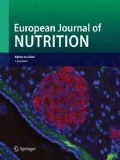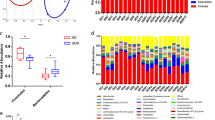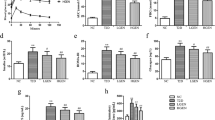Abstract
Purpose
Recent evidence has demonstrated that the gut microbiota plays a critical role in the treatment of obesity and other metabolic dysfunctions. Ginger (Zingiber officinale Roscoe), one of the most commonly used spices and dietary supplements, has been shown to exert beneficial effects against obesity and related disorders. However, to date, the mechanisms linking these effects to the gut microbiota remain unclear. This study aims to investigate the relationship between the gut microbiota and the metabolic adaptations resulting from ginger supplementation in mice.
Methods
Four groups of mice were fed a normal chow diet (NCD) or a high-fat diet (HFD) with or without ginger supplementation for 16 weeks. Lipid profiles, proinflammatory cytokines, glucose tolerance, microbiota composition and short-chain fatty acid (SCFA) concentrations were analyzed at the end of the experiment. In addition, microbiota-depleted mice were transplanted with the fecal microbiota of mice fed a HFD or mice fed a HFD along with ginger supplementation. Glucose tolerance and microbiota composition were assessed after a 8-week fecal microbiota transplantation (FMT).
Results
We observed marked decreases in body weight, liver steatosis, and low-grade inflammation as well as amelioration of insulin resistance in the HFD-fed mice treated with ginger. Furthermore, ginger supplementation modulated the gut microbiota composition and increased species belonging to the Bifidobacterium genus and SCFA-producing bacteria (Alloprevotella and Allobaculum), along with increases in fecal SCFA concentrations. The FMT experiment showed anti-obesity and microbiota-modulating effects similar to those observed in the oral ginger-feeding experiment.
Conclusions
This study suggests that modulation of the gut microbiota as a result of ginger supplementation has a therapeutic effect on obesity in mice.















Similar content being viewed by others
References
World Health Organization (2018) Obesity and overweight. http://www.who.int/mediacentre/factsheets/fs311/en/. Accessed 13 Mar 2018
Brahe LK, Astrup A, Larsen LH (2016) Can we prevent obesity-related metabolic diseases by dietary modulation of the gut microbiota? Adv Nutr 7(1):90–101. https://doi.org/10.3945/an.115.010587
Schroeder BO, Bäckhed F (2016) Signals from the gut microbiota to distant organs in physiology and disease. Nat Med 22(10):1079–1089. https://doi.org/10.1038/nm.4185
Zhao L (2013) The gut microbiota and obesity: from correlation to causality. Nat Rev Microbiol 11(9):639–647. https://doi.org/10.1038/nrmicro3089
Suárezzamorano N, Fabbiano S, Chevalier C et al (2015) Microbiota depletion promotes browning of white adipose tissue and reduces obesity. Nat Med 21(12):1497–1501. https://doi.org/10.1038/nm.3994
Qin J, Li R, Raes J et al (2010) A human gut microbial gene catalogue established by metagenomic sequencing. Nature 464(7285):59–65. https://doi.org/10.1038/nature08821
Rosenbaum M, Knight R, Leibel RL (2015) The gut microbiota in human energy homeostasis and obesity. Trends Endocrinol Metab 26(9):493. https://doi.org/10.1016/j.tem.2015.07.002
Cani PD, Amar J, Iglesias MA et al (2007) Metabolic endotoxemia initiates obesity and insulin resistance. Diabetes 56(7):1761–1772. https://doi.org/10.2337/db06-1491
Bindels LB, Delzenne NM, Cani PD et al (2015) Towards a more comprehensive concept for prebiotics. Nat Rev Gastroenterol Hepatol 12(5):303–310. https://doi.org/10.1038/nrgastro.2015.47
Tremaroli V, Bäckhed F (2012) Functional interactions between the gut microbiota and host metabolism. Nature 489(7415):242–249. https://doi.org/10.1038/nature11552
Bartley JP, Jacobs AL (2000) Effects of drying on flavour compounds in Australian-grown ginger (Zingiber officinale). J Sci Food Agric 80(2):209–215. https://doi.org/10.1002/(SICI)1097-0010(20000115)80:2%3C209::AID-JSFA516%3E3.0.CO;2-8
Li Y, Hong Y, Han Y et al (2016) Chemical characterization and antioxidant activities comparison in fresh, dried, stir-frying and carbonized ginger. J Chromatogr B Anal Technol Biomed Life Sci 1011:223–232. https://doi.org/10.1016/j.jchromb.2016.01.009
Ezzat SM, Ezzat MI, Okba MM et al (2018) The hidden mechanism beyond ginger (Zingiber officinale Rosc.) potent in vivo and in vitro anti-inflammatory activity. J Ethnopharmacol 214:113–123. https://doi.org/10.1016/j.jep.2017.12.019
Lee SH, Cekanova M, Baek SJ (2008) Multiple mechanisms are involved in 6-gingerol-induced cell growth arrest and apoptosis in human colorectal cancer cells. Mol Carcinog 47(3):197–208. https://doi.org/10.1002/mc.20374
Lee JO, Kim N, Lee HJ et al (2015) 6-Gingerol affects glucose metabolism by dual regulation via the AMPKα2-mediated AS160–Rab5 pathway and AMPK-mediated insulin sensitizing effects. J Cell Biochem 116(7):1401–1410. https://doi.org/10.1002/jcb.25100
Tohma H, Gülçin İ, Bursal E et al (2016) Antioxidant activity and phenolic compounds of ginger (Zingiber officinale Rosc.) determined by HPLC-MS/MS. J Food Meas Charact 11(2):556–566. https://doi.org/10.1007/s11694-016-9423-z
Misawa K, Hashizume K, Yamamoto M et al (2015) Ginger extract prevents high-fat diet-induced obesity in mice via activation of the peroxisome proliferator-activated receptor δ pathway. J Nutr Biochem 26(10):1058–1067. https://doi.org/10.1016/j.jnutbio.2015.04.014
Sani NFA, Belani LK, Chong PS et al (2014) Effect of the combination of gelam honey and ginger on oxidative stress and metabolic profile in streptozotocin-induced diabetic sprague-dawley rats. Biomed Res Int 2014(4):160695. https://doi.org/10.1155/2014/160695
Akinyemi AJ, Thome GR, Morsch VM et al (2015) Effect of dietary supplementation of ginger and turmeric rhizomes on ectonucleotidases, adenosine deaminase and acetylcholinesterase activities in synaptosomes from the cerebral cortex of hypertensive rats. J Appl Biomed 14(1):59–70. https://doi.org/10.1016/j.jab.2015.06.001
Gao H, Guan T, Li C et al (2012) Treatment with ginger ameliorates fructose-induced fatty liver and hypertriglyceridemia in rats: modulation of the hepatic carbohydrate response element-binding protein-mediated pathway. Evid Based Complement Altern Med 2012:570948. https://doi.org/10.1155/2012/570948
Wang J, Ke W, Bao R et al (2017) Beneficial effects of ginger Zingiber officinale Roscoe on obesity and metabolic syndrome: a review. Ann N Y Acad Sci 1398(1):83–98. https://doi.org/10.1111/nyas.13375
Amato KR, Yeoman CJ, Kent A et al (2013) Habitat degradation impacts black howler monkey (Alouatta pigra) gastrointestinal microbiomes. ISME J 7(7):1344–1353. https://doi.org/10.1038/ismej.2013.16
Segata N, Izard J, Waldron L et al (2011) Metagenomic biomarker discovery and explanation. Genome Biol 12(6):R60. https://doi.org/10.1186/gb-2011-12-6-r60
Langille MG, Zaneveld J, Caporaso JG et al (2013) Predictive functional profiling of microbial communities using 16S rRNA marker gene sequences. Nat Biotechnol 31(9):814–821. https://doi.org/10.1038/nbt.2676
Yu H, Guo Z, Shen S et al (2016) Effects of taurine on gut microbiota and metabolism in mice. Amino Acids 48(7):1601–1617. https://doi.org/10.1007/s00726-016-2219-y
Chang CJ, Lin CS, Lu CC, et al (2015) Ganoderma lucidum reduces obesity in mice by modulating the composition of the gut microbiota. Nat Commun 6(163):1360–1374. https://doi.org/10.1038/ncomms8489
Li G, Xie C, Lu S, et al (2017) Intermittent fasting promotes white adipose browning and decreases obesity by shaping the gut microbiota. Cell Metab 4(26):672–685. https://doi.org/10.1016/j.cmet.2017.08.019
Matsuda A, Wang ZZ, Takahashi S et al (2009) Upregulation of mRNA of retinoid binding protein and fatty acid binding protein by cholesterol enriched-diet and effect of ginger on lipid metabolism. Life Sci 84:903–907. https://doi.org/10.1016/j.lfs.2009.04.004
Wellen KE, Fucho R, Gregor MF et al (2007) Coordinated regulation of nutrient and inflammatory responses by STAMP2 is essential for metabolic homeostasis. Cell 129(3):451–452. https://doi.org/10.1016/j.cell.2007.02.049
Fontana L, Eagon JC, Trujillo ME et al (2007) Visceral fat adipokine secretion is associated with systemic inflammation in obese humans. Diabetes 56(4):1010–1013. https://doi.org/10.2337/db06-1656
Boulangé CL, Neves AL, Chilloux J et al (2016) Impact of the gut microbiota on inflammation, obesity, and metabolic disease. Genome Med 8(1):42. https://doi.org/10.1186/s13073-016-0303-2
Tzeng TF, Liou SS, Chang CJ et al (2015) 6-Gingerol dampens hepatic steatosis and inflammation in experimental nonalcoholic steatohepatitis. Phytomedicine 22(4):452–461. https://doi.org/10.1016/j.phymed.2015.01.015
Nammi S, Sreemantula S, Roufogalis BD (2010) Protective effects of ethanolic extract of Zingiber officinale rhizome on the development of metabolic syndrome in high-fat diet-fed rats. Basic Clin Pharmacol Toxicol 104(5):366–373. https://doi.org/10.1111/j.1742-7843.2008.00362.x
Brahmanaidu P, Uddandrao VV, Ravindarnaik RC et al (2015) Ameliorative potential of gingerol: Promising modulation of inflammatory factors and lipid marker enzymes expressions in HFD induced obesity in rats. Mol Cell Endocrinol 419(5):139–147. https://doi.org/10.1016/j.mce.2015.10.007
Yu Y, Zick S, Li X et al (2011) Examination of the pharmacokinetics of active ingredients of ginger in humans. The AAPS J 13(3):417. https://doi.org/10.1208/s12248-011-9286-5
Arora T, Bäckhed F (2016) The gut microbiota and metabolic disease: current understanding and future perspectives. J Intern Med 280(4):339–349. https://doi.org/10.1111/joim.12508
Zhang X, Zhao Y, Xu J et al (2015) Modulation of gut microbiota by berberine and metformin during the treatment of high-fat diet-induced obesity in rats. Sci Rep 5(6):14405. https://doi.org/10.1038/srep14405
Barczynska R, Jurgoński A, Slizewska K et al (2017) Effects of potato dextrin on the composition and metabolism of the gut microbiota in rats fed standard and high-fat diets. J Funct Foods 34:398–407. https://doi.org/10.1016/j.jff.2017.05.023
Ming L, Wang Y, Fan G et al (2017) Balancing herbal medicine and functional food for prevention and treatment of cardiometabolic diseases through modulating gut microbiota. Front Microbiol 8:2146. https://doi.org/10.3389/fmicb.2017.02146
Schultz M, Timmer A, Herfarth HH et al (2004) Lactobacillus GG in inducing and maintaining remission of Crohn’s disease. BMC Gastroenterol 4(1):5. https://doi.org/10.1186/1471-230X-4-5
Zhang S, Yang J, Henning SM et al (2017) Dietary pomegranate extract and inulin affect gut microbiome differentially in mice fed an obesogenic diet. Anaerobe 48:184–193. https://doi.org/10.1016/j.anaerobe.2017.08.017
Cani PD, Neyrinck AM, Fava F et al (2007) Selective increases of bifidobacteria in gut microflora improve high-fat-diet-induced diabetes in mice through a mechanism associated with endotoxaemia. Diabetologia 50(11):2374–2383. https://doi.org/10.1007/s00125-007-0791-0
Zhang CH, Zhang MH, Wang SY et al (2010) Interactions between gut microbiota, host genetics and diet relevant to development of metabolic syndromes in mice. ISME J 4(2):232–241. https://doi.org/10.1038/ismej.2009.112
Everard A, Lazarevic V, Gaïa N et al (2014) Microbiome of prebiotic-treated mice reveals novel targets involved in host response during obesity. ISME J 8(10):2116–2130. https://doi.org/10.1038/ismej.2014.45
Kim KA, Gu W, Lee IA et al (2012) High fat diet-induced gut microbiota exacerbates inflammation and obesity in mice via the TLR4 signaling pathway. PLoS One 7(10):e47713. https://doi.org/10.1371/journal.pone.0047713
Sen T, Cawthon CR, Ihde BT et al (2017) Diet-driven microbiota dysbiosis is associated with vagal remodeling and obesity. Physiol Behav 173:305–317. https://doi.org/10.1016/j.physbeh.2017.02.027
Duca FA, Sakar Y, Lepage P et al (2014) Replication of obesity and associated signaling pathways through transfer of microbiota from obese-prone rats. Diabetes 63(5):1624–1636. https://doi.org/10.2337/db13-1526
Xiao S, Fei N, Pang X et al (2014) A gut microbiota-targeted dietary intervention for amelioration of chronic inflammation underlying metabolic syndrome. FEMS Microbiol Ecol 87(2):357–367. https://doi.org/10.1111/1574-6941.12228
Canfora EE, Jocken JW, Blaak EE (2015) Short-chain fatty acids in control of body weight and insulin sensitivity. Nat Rev Endocrinol 11(10):577. https://doi.org/10.1038/nrendo.2015.128
Chang DH, Rhee MS, Ahn S et al (2015) Erratum to: Faecalibaculum rodentium gen. nov., sp. nov., isolated from the faeces of a laboratory mouse. Antonie Van Leeuwenhoek 108(6):1–1. https://doi.org/10.1007/s10482-015-0583-3
Tsai YT, Cheng PC, Pan TM (2014) Anti-obesity effects of gut microbiota are associated with lactic acid bacteria. Appl Microbiol Biotechnol 98(1):1–10. https://doi.org/10.1007/s00253-013-5346-3
Acknowledgements
This work was supported by the Beijing Municipal Science and Technology Project (Grant number D16110500540001).
Author information
Authors and Affiliations
Corresponding author
Ethics declarations
Conflict of interest
The authors declare no competing interests.
Electronic supplementary material
Below is the link to the electronic supplementary material.
Rights and permissions
About this article
Cite this article
Wang, J., Wang, P., Li, D. et al. Beneficial effects of ginger on prevention of obesity through modulation of gut microbiota in mice. Eur J Nutr 59, 699–718 (2020). https://doi.org/10.1007/s00394-019-01938-1
Received:
Accepted:
Published:
Issue Date:
DOI: https://doi.org/10.1007/s00394-019-01938-1




